Parcour Barricades
Warszawianka 1905 roku [Варшавянка; La Varsovienne; ¡A las barricadas!]
![Warszawianka 1905 roku [Варшавянка; La Varsovienne; ¡A las barricadas!]](img/thumb/c6506_130x140.jpeg?1328189496)
Hành khúc Vácsava
(continuer)
(continuer)
envoyé par Boreč 18/5/2022 - 13:56
Dear Boreč,
As you can see, I have integrated your Rōmaji transcription and English translation into the relevant page section. Thank you for your effort, which your translation helps appreciate in its fullness. As for Kaji Wataru's image, I have reproduced it for other sources. Sadly enough, it is quite complicated for us to implement images into our site from imgur and/or other image tools.
Just one last question: what does rōdōka exactly mean in Japanese?
As you can see, I have integrated your Rōmaji transcription and English translation into the relevant page section. Thank you for your effort, which your translation helps appreciate in its fullness. As for Kaji Wataru's image, I have reproduced it for other sources. Sadly enough, it is quite complicated for us to implement images into our site from imgur and/or other image tools.
Just one last question: what does rōdōka exactly mean in Japanese?
Riccardo Venturi 18/5/2022 - 16:59
Thanks for editing article :)
Well, /Rōdōka/ means «workers' song» in Japanese.
So, when translate it into English, /Warushawa-Rōdōka/ means «Warsaw workers’ song». ( ̄∇ ̄)
Well, /Rōdōka/ means «workers' song» in Japanese.
So, when translate it into English, /Warushawa-Rōdōka/ means «Warsaw workers’ song». ( ̄∇ ̄)
Boreč 18/5/2022 - 23:46
![Warszawianka 1905 roku [Варшавянка; La Varsovienne; ¡A las barricadas!]](img/upl/yakuvars1.jpg)
1φ. Versione yakuta (o Sakha) di A. F. Boyarov
1φ. Yakut (Sakha) version by A. F. Boyarov
Info about Yakut: Yakut language, also known as Yakutian, Sakha, Saqa or Saxa (Yakut: саха тыла), is a Turkic language with around 450,000 native speakers spoken in Sakha (Yakutia), a federal republic in the Russian Federation, by the Yakuts. The Yakut language differs from all other Turkic languages in the presence of a layer of vocabulary of unclear origin (possibly Paleo-Siberian). There are also a large number of words of Mongolian origin related to ancient borrowings, as well as numerous recent borrowings from Russian. Like other Turkic languages and their ancestor Proto-Turkic, Yakut is an agglutinative language and employs vowel harmony.
I found a very rare language Warszawianka...assume it was probably translated during the Russian Revolution.
There maybe many more warszawianka in Russia… [Boreč]
Dear... (continuer)
1φ. Yakut (Sakha) version by A. F. Boyarov
Info about Yakut: Yakut language, also known as Yakutian, Sakha, Saqa or Saxa (Yakut: саха тыла), is a Turkic language with around 450,000 native speakers spoken in Sakha (Yakutia), a federal republic in the Russian Federation, by the Yakuts. The Yakut language differs from all other Turkic languages in the presence of a layer of vocabulary of unclear origin (possibly Paleo-Siberian). There are also a large number of words of Mongolian origin related to ancient borrowings, as well as numerous recent borrowings from Russian. Like other Turkic languages and their ancestor Proto-Turkic, Yakut is an agglutinative language and employs vowel harmony.
I found a very rare language Warszawianka...assume it was probably translated during the Russian Revolution.
There maybe many more warszawianka in Russia… [Boreč]
Dear... (continuer)
Варшавянка [1]
(continuer)
(continuer)
envoyé par Boreč 19/5/2022 - 10:29
Oh, sorry, I forgot the source…
I have integrated your source and pics into the relevant page section. Thank you!
Boreč 19/5/2022 - 11:32
1r1. Altra versione danese
1r1. Alternative Danish version
"I found an alternative text of the Danish Warszawianka. This text was published in a Danish poetry collection. It was probably translated from the Russian version of Krzyżanowski's text." [Boreč]
1r1. Alternative Danish version
"I found an alternative text of the Danish Warszawianka. This text was published in a Danish poetry collection. It was probably translated from the Russian version of Krzyżanowski's text." [Boreč]
Warszawjanka
(continuer)
(continuer)
envoyé par Boreč 25/5/2022 - 10:10
1χ. Versione casciuba (Mislaus Lasota, Lyricstranslate)
1χ. Kashubian version (Mislaus Lasota, Lyricstranslate)
1χ. Kashubian version (Mislaus Lasota, Lyricstranslate)
Kashubian or Cassubian (Kashubian: kaszëbsczi jãzëk, Polish: język kaszubski) is a West Slavic language belonging to the Lechitic subgroup along with Polish and Silesian lect. Although often classified as a language in its own right, it is sometimes viewed as a dialect of Pomeranian or as a dialect of Polish. This singable and poetic text was posted on Lyricstranslate. I wouldn't be surprised if the song is sung in Polish dialects, or rather the song could be translated in various dialects as well. [Boreč]
Warszawiónka
(continuer)
(continuer)
envoyé par Boreč 2/6/2022 - 19:06
1β1. Altra versione turca ("Haydi yoldaşlar")
1β1. A different Turkish version ("Haydi yoldaşlar")
Il testo (il cui autore rimane sconosciuto) è stato pubblicato nel 1976 sulla rivista ufficiale del Partito Turco del Lavoro (Türkiye İşçi Partisi) ; la Warszawianka ha qui il titolo di "Haydi yoldaşlar" (“Avanti, Compagni di strada”, o semplicemente “Compagni”) o di "Varşovienka" nella Turchia continentale. Dopo aver tradotto i testi (in giapponese), ho sentito che i testi sembrano essere leggermente influenzati dalla classica versione francese di Stefan Priacel risalente a ca. il 1930.
These (still unauthored) Turkish lyrics were published in 1976 in the official magazine of the Turkish Labour Party (Türkiye İşçi Partisi); the Warszawianka bears here the title of "Haydi yoldaşlar" (“Forwards, Comrades!”), or "Varşovienka" in continental Turkey. After translating the lyrics (into Japanese),... (continuer)
1β1. A different Turkish version ("Haydi yoldaşlar")
Il testo (il cui autore rimane sconosciuto) è stato pubblicato nel 1976 sulla rivista ufficiale del Partito Turco del Lavoro (Türkiye İşçi Partisi) ; la Warszawianka ha qui il titolo di "Haydi yoldaşlar" (“Avanti, Compagni di strada”, o semplicemente “Compagni”) o di "Varşovienka" nella Turchia continentale. Dopo aver tradotto i testi (in giapponese), ho sentito che i testi sembrano essere leggermente influenzati dalla classica versione francese di Stefan Priacel risalente a ca. il 1930.
These (still unauthored) Turkish lyrics were published in 1976 in the official magazine of the Turkish Labour Party (Türkiye İşçi Partisi); the Warszawianka bears here the title of "Haydi yoldaşlar" (“Forwards, Comrades!”), or "Varşovienka" in continental Turkey. After translating the lyrics (into Japanese),... (continuer)
Haydi yoldaşlar (Varşovienka)
(continuer)
(continuer)
envoyé par Boreč 6/7/2022 - 14:08
1ψ. Versione azera di Morrigan De Ferelden
1ψ. Azerbaijani version by Morrigan De Ferelden
"This is a revised version of the previously contributed Azerbaijani text. I described before that the lyricist was unknown, but the lyricist was Morrigan de Ferelden, who was my comrade." [Boreč]
1ψ. Azerbaijani version by Morrigan De Ferelden
"This is a revised version of the previously contributed Azerbaijani text. I described before that the lyricist was unknown, but the lyricist was Morrigan de Ferelden, who was my comrade." [Boreč]
Varşavyanka [1]
(continuer)
(continuer)
envoyé par Boreč 8/7/2022 - 10:37
![Warszawianka 1905 roku [Варшавянка; La Varsovienne; ¡A las barricadas!]](img/upl/tokiponapron.png)
1ω. La Warszawianka in Toki Pona di "Kokoa"
1ω. The Warszawianka in Toki Pona by "Kokoa"
Il Toki Pona è una lingua artificiale creata nel 2001 dalla traduttrice, linguista e esperantista Sonja Lang (per ulteriori notizie si rimanda anche alle due versioni dell'Internazionale in Toki Pona presenti nel sito, risp. qui e qui). La versione in Toki Pona della Warszawianka è stata adattata nel 2021 dal discente di Toki Pona giapponese “Kokoa”, basandosi sul testo giapponese.
Toki Pona (“the language of good” or “simple talk”) is a constructed language created in 2001 by the Canadian translator, linguist and Esperantist Sonja Lang (for further information, see the two versions of the Internationale in Toki Pona included in this site, viz. here and here). The Toki Pona version of the Warszawianka was adapted by the Japanese Toki Pona language learner “Kokoa”, based on the Japanese text.
1ω. The Warszawianka in Toki Pona by "Kokoa"
Il Toki Pona è una lingua artificiale creata nel 2001 dalla traduttrice, linguista e esperantista Sonja Lang (per ulteriori notizie si rimanda anche alle due versioni dell'Internazionale in Toki Pona presenti nel sito, risp. qui e qui). La versione in Toki Pona della Warszawianka è stata adattata nel 2021 dal discente di Toki Pona giapponese “Kokoa”, basandosi sul testo giapponese.
Toki Pona (“the language of good” or “simple talk”) is a constructed language created in 2001 by the Canadian translator, linguist and Esperantist Sonja Lang (for further information, see the two versions of the Internationale in Toki Pona included in this site, viz. here and here). The Toki Pona version of the Warszawianka was adapted by the Japanese Toki Pona language learner “Kokoa”, based on the Japanese text.
Warszawianka
(continuer)
(continuer)
envoyé par Boreč 19/9/2022 - 03:13
1ψ1. Versione azera di Nariman Narimanov, Mashadi Azizbayov e Mirza Abdulgadir Vusaghi Ismayilzade
1ψ1. Azerbaijani version by Nariman Narimanov, Mashadi Azizbayov e Mirza Abdulgadir Vusaghi Ismayilzade
"One of the songs in the Azerbaijani opera "Sevil" is the famous revolutionary song "Warszawianka". The text has been translated into Azerbaijani twice in recorded history, with the poets Nariman Narimanov, Mashadi Azizbayov and Mirza Abdulgadir Vusaghi Ismayilzade completing the Azerbaijani translation. I have been searching through various information resources to find the complete text of this, but unfortunately I could not find the lyrics. I would like to share it here on Antiwarsong.org as a valuable source of information." [Boreč]
Title: Varşavianka
Original: Warszawianka 1905 roku
Japanese title: ワルシャワ労働歌
Country: Azerbaijan
Language: Azerbaijani
Composer:Józef Pławiński (Юзеф... (continuer)
1ψ1. Azerbaijani version by Nariman Narimanov, Mashadi Azizbayov e Mirza Abdulgadir Vusaghi Ismayilzade
"One of the songs in the Azerbaijani opera "Sevil" is the famous revolutionary song "Warszawianka". The text has been translated into Azerbaijani twice in recorded history, with the poets Nariman Narimanov, Mashadi Azizbayov and Mirza Abdulgadir Vusaghi Ismayilzade completing the Azerbaijani translation. I have been searching through various information resources to find the complete text of this, but unfortunately I could not find the lyrics. I would like to share it here on Antiwarsong.org as a valuable source of information." [Boreč]
Title: Varşavianka
Original: Warszawianka 1905 roku
Japanese title: ワルシャワ労働歌
Country: Azerbaijan
Language: Azerbaijani
Composer:Józef Pławiński (Юзеф... (continuer)
"XX əsrin əvvəllərində hər bir xalqın inqilabi ruhda olan milli mahnıları ilə yanaşı, bütün bəşəriyyətin bey nəlmiləlçi zəhmətkeş qüvvələrini təmsil edən mahnıları da dillər əzbəri idi. Belə mahnıların ən geniş yayılanlarından biri “Varşavyanka” idi. Mərkəzi və Şərqi Avropada məşhur olan “Varşavyanka’’nm melodiyası XIX əsrin ortalarında Parisdə yaşayan polyak mühacirlərinin oxuduqları bir nəğmədən götürülmüşdü. 1883-cü ildə Polşa inqilabçılarından Vatslav Sve- nitski bir neçə il həbsxanada yatdıqdan sonra “Varşavyanka”nın polyak dilində olan ilk mətnini yaratmışdı. Sonralar mətn alman, çex, rumın, Azərbaycan və başqa dillərə də tərcümə olunmuşdu. Azərbaycanın görkəmli simalarından olan Nəriman Nərimanov və Məşədi Əzizbəyov hələ 1908-ci ildə “Varşavyanka"nın Azərbaycan dilinə tərcüməsini təşkil... (continuer)
envoyé par Boreč 19/9/2022 - 03:27
1ε1. Versione lituana "socialdemocratica" del 1918
1ε1. Lithuanian "Social-Democratic" version from 1918
This text was published in the revolutionary song book "Revoliucijos dainos 1918", which circulated among Lithuanian Social Democrats." There are indications that this text was translated from the Russian version, whereas another version of the text beginning "Kelkim augštyn mųs' vēliavą drąsiai" was translated from the original Polish version. The author is currently unknown. Another LP record of "Varšuvietė" with a different text is also known from Lithuania. Further research will continue. [Boreč]
Questo testo fu pubblicato nel libro di canzoni rivoluzionarie "Revoliucijos dainos 1918", che circolava tra i socialdemocratici lituani". Ci sono indicazioni che questo testo sia stato tradotto dalla versione russa, mentre un'altra versione del testo che inizia "Kelkim augštyn mųs' vēliavą... (continuer)
1ε1. Lithuanian "Social-Democratic" version from 1918
This text was published in the revolutionary song book "Revoliucijos dainos 1918", which circulated among Lithuanian Social Democrats." There are indications that this text was translated from the Russian version, whereas another version of the text beginning "Kelkim augštyn mųs' vēliavą drąsiai" was translated from the original Polish version. The author is currently unknown. Another LP record of "Varšuvietė" with a different text is also known from Lithuania. Further research will continue. [Boreč]
Questo testo fu pubblicato nel libro di canzoni rivoluzionarie "Revoliucijos dainos 1918", che circolava tra i socialdemocratici lituani". Ci sono indicazioni che questo testo sia stato tradotto dalla versione russa, mentre un'altra versione del testo che inizia "Kelkim augštyn mųs' vēliavą... (continuer)
Varšuvietė [1]
(continuer)
(continuer)
envoyé par Boreč 3/10/2022 - 03:10
3δ. La versione persiana 3v. resa in lingua tagica
3δ. The Persian version 3v. rendered in Tajik
The Persian text (یک صف شویم) was converted into Tajik.
According to one source, the piece is one of the songs of the Monafeghin, an Iranian dissident militant organisation that participated in the Iranian Revolution and the Iran-Iraq War, which is Islamist and aims to overthrow the Islamic Republic.
Secondo una fonte, il brano è una delle canzoni del Monafeghin, un'organizzazione militante dissidente iraniana che ha partecipato alla Rivoluzione iraniana e alla guerra Iran-Iraq, che è islamista e mira a rovesciare la Repubblica islamica. [Boreč]
3δ. The Persian version 3v. rendered in Tajik
The Persian text (یک صف شویم) was converted into Tajik.
According to one source, the piece is one of the songs of the Monafeghin, an Iranian dissident militant organisation that participated in the Iranian Revolution and the Iran-Iraq War, which is Islamist and aims to overthrow the Islamic Republic.
Secondo una fonte, il brano è una delle canzoni del Monafeghin, un'organizzazione militante dissidente iraniana che ha partecipato alla Rivoluzione iraniana e alla guerra Iran-Iraq, che è islamista e mira a rovesciare la Repubblica islamica. [Boreč]
Як саф шавем
(continuer)
(continuer)
envoyé par Boreč 14/10/2022 - 01:27
2η. La versione persiana 2ε. resa in lingua tagica
2η. The Persian version 2ε. rendered in Tajik
"I have attempted to render the 2ε text in Tajik. Although there may be some differences with the orthography as defined in modern Tajikistan, I would like to contribute here as a source of material.
Ho cercato di rendere il testo 2ε in tagico. Anche se ci possono essere alcune differenze con l'ortografia definita nel Tagikistan moderno, vorrei contribuire qui come fonte di materiale." [Boreč]
2η. The Persian version 2ε. rendered in Tajik
"I have attempted to render the 2ε text in Tajik. Although there may be some differences with the orthography as defined in modern Tajikistan, I would like to contribute here as a source of material.
Ho cercato di rendere il testo 2ε in tagico. Anche se ci possono essere alcune differenze con l'ortografia definita nel Tagikistan moderno, vorrei contribuire qui come fonte di materiale." [Boreč]
Варшавянка
(continuer)
(continuer)
envoyé par Boreč 14/10/2022 - 02:04
Riccardo Venturi 14/10/2022 - 11:20
Riccardo Venturi 23/10/2022 - 03:02
2d1. French literal translation*
Aux barricades!
(continuer)
(continuer)
envoyé par Riccardo Venturi 25/10/2022 - 19:59
2θ. La versione retoromanza (Romantsch Grischun) del gruppo ecologista anarchico “Capuns e Maluns” - Val Surselva (Cantone dei Grigioni)
2θ Rhaeto-Romance (Romantsch Grischun) version by the Eco-Anarchist Group “Capuns e Maluns” - Val Surselva (Canton of the Grisons)
2θ Rhaeto-Romance (Romantsch Grischun) version by the Eco-Anarchist Group “Capuns e Maluns” - Val Surselva (Canton of the Grisons)
Inviatami su richiesta, con ringraziamenti enormi. Nell'invio, è stato esplicitamente specificato che, nel retoromanzo dei Grigioni, si ha l'unico caso in cui il titolo corrisponde perfettamente a quello originale spagnolo. La versione è un lavoro collettivo e gli autori desiderano restare anonimi. Engraziel, cumpogns! [RV]
A las barricadas
(continuer)
(continuer)
envoyé par Riccardo Venturi 25/10/2022 - 21:38
2ι. Traduzione letterale lituana*
2ι. Lithuanian literal translation*
2ι. Lithuanian literal translation*
A las Barricadas (liet. Prie barikadų) – viena populiariausių Ispanijos anarchistų dainų per Ispanijos pilietinį karą. Dainos žodžius 1936 m. parašė Valeriano Orobón Fernández.
Dainoje minima „Konfederacija“ – tai anarchosindikalistinė CNT (Nacionalinė darbo konfederacija), kuri tuo metu buvo didžiausia profesinė sąjunga, pagrindinė anarchistų organizacija Ispanijoje, o 1936–1939 m. buvo pagrindinė jėga, pasipriešinusi Fransisko Franko kariniam perversmui prieš Ispanijos Respubliką. - lt.wikipedia
Dainoje minima „Konfederacija“ – tai anarchosindikalistinė CNT (Nacionalinė darbo konfederacija), kuri tuo metu buvo didžiausia profesinė sąjunga, pagrindinė anarchistų organizacija Ispanijoje, o 1936–1939 m. buvo pagrindinė jėga, pasipriešinusi Fransisko Franko kariniam perversmui prieš Ispanijos Respubliką. - lt.wikipedia
Prie barikadų
(continuer)
(continuer)
envoyé par Riccardo Venturi 25/10/2022 - 22:30
![Warszawianka 1905 roku [Варшавянка; La Varsovienne; ¡A las barricadas!]](img/upl/mileklopcic.jpg)
1א. Varšavljanka 1905 - Versione slovena di Mile Klopčič (1943)
1א. Varšavljanka 1905 Slovenian version by Mile Klopčič (1943)
Performer: Trieste Partisan Choir (Tržaški Partizanski Pevski Zbor)
Year recorded: 1977
Composer: Józef Pławiński
Year composed: 1879
Lyricist: Mile Klopčič, based on Polish lyrics by Wacław Święcicki
Year written: 1943 (Slovene version), 1879 (Polish original)
Source: Vinyl record "Zemlja in Narodi / La Terra e i Popoli"
Picture: President of Yugoslavia Josip Broz Tito
and Chairman of Poland Aleksander Zawadzki in Warsaw, Poland.
The text of the Slovenian version was written in 1943 by the Slovenian poet Mile Klopčič. He was active as a communist after joining the Yugoslav Communist Party in 1920, took part in the Yugoslav partisan movement during World War II and was appointed chairman of the Cultural Committee of the Slovenian Liberation Council (SNOS),... (continuer)
1א. Varšavljanka 1905 Slovenian version by Mile Klopčič (1943)
Performer: Trieste Partisan Choir (Tržaški Partizanski Pevski Zbor)
Year recorded: 1977
Composer: Józef Pławiński
Year composed: 1879
Lyricist: Mile Klopčič, based on Polish lyrics by Wacław Święcicki
Year written: 1943 (Slovene version), 1879 (Polish original)
Source: Vinyl record "Zemlja in Narodi / La Terra e i Popoli"
Picture: President of Yugoslavia Josip Broz Tito
and Chairman of Poland Aleksander Zawadzki in Warsaw, Poland.
The text of the Slovenian version was written in 1943 by the Slovenian poet Mile Klopčič. He was active as a communist after joining the Yugoslav Communist Party in 1920, took part in the Yugoslav partisan movement during World War II and was appointed chairman of the Cultural Committee of the Slovenian Liberation Council (SNOS),... (continuer)
Varšavljanka 1905 [Na barikade]
(continuer)
(continuer)
envoyé par Riccardo Venturi 26/10/2022 - 01:35
@ Borec
I have moved to 1א the entire info about the Slovenian version (as you can see, we have exhausted the Latin and Greek alphabets for section 1, and we're now in with the Hebrew alphabet!). Btw, did you see this? I think it should be interesting for your YT channel, too. Thank you, arigato!
I have moved to 1א the entire info about the Slovenian version (as you can see, we have exhausted the Latin and Greek alphabets for section 1, and we're now in with the Hebrew alphabet!). Btw, did you see this? I think it should be interesting for your YT channel, too. Thank you, arigato!
Boreč 26/10/2022 - 07:34
The official Albanian version of Varshavianka was found to be included in a collection of Albanian partisan songs published in 1959. But it is too far away to buy from my country...
La versione ufficiale albanese della Varshavianka è reperibile in una raccolta di canzoni partigiane albanesi pubblicata nel 1959. Ma è troppo lontana per essere acquistata nel mio paese...
La versione ufficiale albanese della Varshavianka è reperibile in una raccolta di canzoni partigiane albanesi pubblicata nel 1959. Ma è troppo lontana per essere acquistata nel mio paese...
Boreč 26/10/2022 - 10:36
@ Borec
I've seen your message concerning the book including the Albanian version, on sale at Sheet Music Warehouse. It's really expensive. I'm afraid we should find someone who can finance us, because you're too far away, and I am too poor (btw, I have no credit card or pay stuff like this). Well, we'll see how to cope with!
I've seen your message concerning the book including the Albanian version, on sale at Sheet Music Warehouse. It's really expensive. I'm afraid we should find someone who can finance us, because you're too far away, and I am too poor (btw, I have no credit card or pay stuff like this). Well, we'll see how to cope with!
Riccardo Venturi 26/10/2022 - 11:31
@ Riccardo Venturi
Well done! And thank you, Riccardo! so impressed! Actually, for a long time I didn't have any info on that version. Now we can finally reveal the details of this international "Whirlwinds of danger"! Really, thanks...
Well done! And thank you, Riccardo! so impressed! Actually, for a long time I didn't have any info on that version. Now we can finally reveal the details of this international "Whirlwinds of danger"! Really, thanks...
Boreč 27/10/2022 - 01:42
2δ1. Versione serba alternativa di un'ignota corale ("MusicAffects Politics"?)
2δ1. Serbian alternative version by an unknown choir ("MusicAffects Politics"?)
Il seguente video (in precedenza attribuito erroneamente alla versione anarcosindacalista serba precedente, la quale, a sua volta, era stata erroneamente attribuita alla lingua croata) riporta una versione serba alternativa eseguita da una ignota corale belgradese il 20 ottobre 2019. Nel video si sente chiaramente, durante la presentazione fatta da una corista, che questa “nostra nuova versione” è stata fatta basandosi su un testo in croato; ma la lingua della versione è serba. Peraltro, esiste comunque qua e là qualche similarità con la versione anarcosindacalista; la versione si interrompe alla terza strofa, senza le barricate. Fa parte di un canale YT intitolato MusicAffects Politics; il video è stato inserito il 21 luglio 2020,... (continuer)
2δ1. Serbian alternative version by an unknown choir ("MusicAffects Politics"?)
Il seguente video (in precedenza attribuito erroneamente alla versione anarcosindacalista serba precedente, la quale, a sua volta, era stata erroneamente attribuita alla lingua croata) riporta una versione serba alternativa eseguita da una ignota corale belgradese il 20 ottobre 2019. Nel video si sente chiaramente, durante la presentazione fatta da una corista, che questa “nostra nuova versione” è stata fatta basandosi su un testo in croato; ma la lingua della versione è serba. Peraltro, esiste comunque qua e là qualche similarità con la versione anarcosindacalista; la versione si interrompe alla terza strofa, senza le barricate. Fa parte di un canale YT intitolato MusicAffects Politics; il video è stato inserito il 21 luglio 2020,... (continuer)
[Lyrics unavailable
(continuer)
(continuer)
envoyé par Riccardo Venturi 28/10/2022 - 21:43
1ε2. Varšuvietė - Versione lituana del 1957
1ε2. Varšuvietė - Lithuanian version from 1957
Title: Varšuvietė
Original: Warszawianka 1905 roku
Country: Lithuania
Language: Lithuanian
Composer: Józef Pławiński
Lyricist: ????
Choir&Orchestra: Lithuanian Radio Symphony Orchestra (Lietuvos radijo simfoninis orkestras)
Year written: 1905
Year recorded: 1957
Record source: Varšuvietė / Drąsiai, Draugai, Koją Kojon
The audio in this video is from the vinyl LP "Varšuvietė / Drąsiai, Draugai, Koją Kojon" released in Lithuania SSR, which has completely different lyrics from the two versions I have previously presented earlier. This Warszawianka performed by the Lithuanian Radio Orchestra, and has long been forgotten by Lithuanians, and my friend told me that there were no longer any audios left in Lithuania, but I managed to collect the vinyl LP. I looked around in the electronic library for... (continuer)
1ε2. Varšuvietė - Lithuanian version from 1957
Title: Varšuvietė
Original: Warszawianka 1905 roku
Country: Lithuania
Language: Lithuanian
Composer: Józef Pławiński
Lyricist: ????
Choir&Orchestra: Lithuanian Radio Symphony Orchestra (Lietuvos radijo simfoninis orkestras)
Year written: 1905
Year recorded: 1957
Record source: Varšuvietė / Drąsiai, Draugai, Koją Kojon
The audio in this video is from the vinyl LP "Varšuvietė / Drąsiai, Draugai, Koją Kojon" released in Lithuania SSR, which has completely different lyrics from the two versions I have previously presented earlier. This Warszawianka performed by the Lithuanian Radio Orchestra, and has long been forgotten by Lithuanians, and my friend told me that there were no longer any audios left in Lithuania, but I managed to collect the vinyl LP. I looked around in the electronic library for... (continuer)
Varšuvietė
(continuer)
(continuer)
envoyé par Boreč 29/10/2022 - 02:15
![Warszawianka 1905 roku [Варшавянка; La Varsovienne; ¡A las barricadas!]](img/upl/juvemald.jpg)
2l1. Para as barricadas - Versione portoghese (brasiliana) del gruppo anarco-punktotal Juventude Maldita (2006)
2l1. Para as barricadas - Portuguese (Brazilian) version by the Anarcho-Punktotal band Juventude Maldita (2006)
Album / Albumi: Germinal
2l1. Para as barricadas - Portuguese (Brazilian) version by the Anarcho-Punktotal band Juventude Maldita (2006)
Album / Albumi: Germinal
Para as barricadas
(continuer)
(continuer)
envoyé par Riccardo Venturi 31/10/2022 - 20:16
1u4. 华沙工人歌 [Huáshā gōngrén gē] - Altra versione cinese alternativa
1u4. 华沙工人歌 [Huáshā gōngrén gē] - Further Chinese alternative version
"It was sung with different lyrics from the source commonly known as the Chinese version. The lyrics themselves were already known in China." [Albatross795]
1u4. 华沙工人歌 [Huáshā gōngrén gē] - Further Chinese alternative version
"It was sung with different lyrics from the source commonly known as the Chinese version. The lyrics themselves were already known in China." [Albatross795]
华沙工人歌
(continuer)
(continuer)
envoyé par Albatross795 30/11/2022 - 14:09
1e1. La versione italiana interpretata da Adriana Martino (con arrangiamento di Benedetto Ghiglia, 1972)
1e1. Italian version performed by Adriana Martino (Arrangement by Benedetto Ghiglia, 1972)
La versione italiana della Varsovienne francese (che ne mantiene anche il titolo), interpretata dalla poliedrica artista Adriana Martino risale al 1972 ed è stata arrangiata dal musicista fiesolano Benedetto Ghiglia, che di Adriana Martino era il marito e che ricordiamo come notevole autore di musiche per film (sua è, ad esempio, la colonna sonora di Corbari di Valentino Orsini). Il brano fa parte dell'album doppio Cosa io posso dirti, contenente un'estesa antologia di canti di lotta, resistenziali e militanti europei. Sebbene ripresa e tradotta dalla versione francese, si tratta senz'altro dell'unica versione d'arte della Warszawianka in lingua italiana. Adriana Martino è nata a Aversa (Napoli)... (continuer)
1e1. Italian version performed by Adriana Martino (Arrangement by Benedetto Ghiglia, 1972)
La versione italiana della Varsovienne francese (che ne mantiene anche il titolo), interpretata dalla poliedrica artista Adriana Martino risale al 1972 ed è stata arrangiata dal musicista fiesolano Benedetto Ghiglia, che di Adriana Martino era il marito e che ricordiamo come notevole autore di musiche per film (sua è, ad esempio, la colonna sonora di Corbari di Valentino Orsini). Il brano fa parte dell'album doppio Cosa io posso dirti, contenente un'estesa antologia di canti di lotta, resistenziali e militanti europei. Sebbene ripresa e tradotta dalla versione francese, si tratta senz'altro dell'unica versione d'arte della Warszawianka in lingua italiana. Adriana Martino è nata a Aversa (Napoli)... (continuer)
La Varsovienne
(continuer)
(continuer)
envoyé par Riccardo Venturi 4/12/2022 - 23:29
![Warszawianka 1905 roku [Варшавянка; La Varsovienne; ¡A las barricadas!]](img/upl/ynnxwt.jpeg)
1ζ1. Versione ucraina di Vasil K. Holovatski [1915]
1ζ1. Ukrainian version by Vasil K. Holovatski [1915]
I have found a translation that is even closer to the original Russian version than the Ukrainian text previously mentioned on this site, and I note it here. This text was published in Ukraine in 1915 by Vasil K. Holovatsky in his labour song collection "Робобітничі пісні". Analysis of the lyrics reveals that it is a direct Ukrainian adaptation of Krzyżanowski's Russian version, which is probably a legitimate successor translation.
Ho trovato una traduzione ancora più vicina alla versione originale russa rispetto al testo ucraino menzionato in precedenza su questo sito, e lo annoto qui. Questo testo fu pubblicato in Ucraina nel 1915 da Vasil K. Holovatski nella sua raccolta di canti di lavoro "Робобітничі пісні". L'analisi dei testi rivela che si tratta di un adattamento ucraino diretto... (continuer)
1ζ1. Ukrainian version by Vasil K. Holovatski [1915]
I have found a translation that is even closer to the original Russian version than the Ukrainian text previously mentioned on this site, and I note it here. This text was published in Ukraine in 1915 by Vasil K. Holovatsky in his labour song collection "Робобітничі пісні". Analysis of the lyrics reveals that it is a direct Ukrainian adaptation of Krzyżanowski's Russian version, which is probably a legitimate successor translation.
Ho trovato una traduzione ancora più vicina alla versione originale russa rispetto al testo ucraino menzionato in precedenza su questo sito, e lo annoto qui. Questo testo fu pubblicato in Ucraina nel 1915 da Vasil K. Holovatski nella sua raccolta di canti di lavoro "Робобітничі пісні". L'analisi dei testi rivela che si tratta di un adattamento ucraino diretto... (continuer)
1.
(continuer)
(continuer)
envoyé par Boreč 24/5/2023 - 04:08
![Warszawianka 1905 roku [Варшавянка; La Varsovienne; ¡A las barricadas!]](img/upl/aiimage.jpg)
1ב. Versione afrikaans di Boreč con l’ausilio della cosiddetta “Intelligenza Artificiale” o IA (Chat GPT)
1ב. Afrikaans version by Boreč through the help of the so-called “Artificial Intelligence” or AI (Chat GPT)
The following Afrikaans lyrics is my experimental translation of the well-known German Warschawjanka that circulated around 1920, using AI technology such as ChatGPT. Unfortunately, I am not proficient in Afrikaans, so can't point out any word omissions or grammatical correctness with any clarity. I contribute it here in case anyone is interested in adapting the song in Afrikaans.
Il seguente testo in afrikaans è la mia traduzione sperimentale della nota Warschawjanka tedesca che circolava intorno al 1920, utilizzando la tecnologia AI come ChatGPT. Sfortunatamente, non sono esperto in afrikaans, quindi non posso indicare alcuna omissione di parole o correttezza grammaticale con... (continuer)
1ב. Afrikaans version by Boreč through the help of the so-called “Artificial Intelligence” or AI (Chat GPT)
The following Afrikaans lyrics is my experimental translation of the well-known German Warschawjanka that circulated around 1920, using AI technology such as ChatGPT. Unfortunately, I am not proficient in Afrikaans, so can't point out any word omissions or grammatical correctness with any clarity. I contribute it here in case anyone is interested in adapting the song in Afrikaans.
Il seguente testo in afrikaans è la mia traduzione sperimentale della nota Warschawjanka tedesca che circolava intorno al 1920, utilizzando la tecnologia AI come ChatGPT. Sfortunatamente, non sono esperto in afrikaans, quindi non posso indicare alcuna omissione di parole o correttezza grammaticale con... (continuer)
Warskouwianka (Warschawjanka)
(continuer)
(continuer)
envoyé par Boreč 25/5/2023 - 14:42
about 1ב. Versione afrikaans
Yesterday, I checked the lyrics again and reworked them using what knowledge I had. Sorry, please replace them with this texts: [...]
Dear Boreč, I have substituted the lyrics (see here). See you soon! [RV]
Yesterday, I checked the lyrics again and reworked them using what knowledge I had. Sorry, please replace them with this texts: [...]
Dear Boreč, I have substituted the lyrics (see here). See you soon! [RV]
Boreč 30/5/2023 - 14:45
1μ1. Traduzione letterale rumena della versione russa
1μ1. Literal Romanian translation of the Russian version
1μ1. Literal Romanian translation of the Russian version
Varșovianca
(continuer)
(continuer)
envoyé par Boreč 2/6/2023 - 04:19
![Warszawianka 1905 roku [Варшавянка; La Varsovienne; ¡A las barricadas!]](img/upl/hakobbooklet.png)
1ג. Վարշավեանկա: La versione armena di Hakob Hakobyan [1902]
1ג. Վարշավեանկա: Hakob Hakobyan's Armenian version [1902]
After a long journey I was finally able to reveal the entire Armenian version of Варшавянка (Վարշավեանկա). This Armenian chant is now revived here after 100 years. The Armenian lyrics were written in 1902 by Hakob Hakobyan (Հակոբ Հակոբյան), the father of the Armenian proletarian literature. He wrote a number of anti-Tsarist lyrics at the same time, including revolutionary songs such as "La Marseillaise" and "L'Internationale".
Hakob Hakobyan was born in Gandzak in 1866, in the family of a craftsman. He studied for a year in the village with a woman named Tsovi Aghi and then entered a parish school. Hakobyan's father wanted to make the boy a priest or a craftsman, but his mother managed to send his son to a gymnasium. Since the Armenian language and literature were forbidden... (continuer)
1ג. Վարշավեանկա: Hakob Hakobyan's Armenian version [1902]
After a long journey I was finally able to reveal the entire Armenian version of Варшавянка (Վարշավեանկա). This Armenian chant is now revived here after 100 years. The Armenian lyrics were written in 1902 by Hakob Hakobyan (Հակոբ Հակոբյան), the father of the Armenian proletarian literature. He wrote a number of anti-Tsarist lyrics at the same time, including revolutionary songs such as "La Marseillaise" and "L'Internationale".
Hakob Hakobyan was born in Gandzak in 1866, in the family of a craftsman. He studied for a year in the village with a woman named Tsovi Aghi and then entered a parish school. Hakobyan's father wanted to make the boy a priest or a craftsman, but his mother managed to send his son to a gymnasium. Since the Armenian language and literature were forbidden... (continuer)
Վարշավեանկա
(continuer)
(continuer)
envoyé par Boreč 2/6/2023 - 12:37
![Warszawianka 1905 roku [Варшавянка; La Varsovienne; ¡A las barricadas!]](img/upl/kengpart1.jpeg)
1π1. Versione albanese dal canzoniere Këngë partizane ("Canti Partigiani", 1959)
Albanian version from the songbook Këngë partizane ("Partisan Songs", 1959)
"Non avrei mai pensato che anche un libro costoso sarebbe costato così tanto da spedire, e avere un libro europeo consegnato in Giappone è ridicolmente costoso. Hahaha… Oh, sì, ho trovato il testo della versione albanese della Warszawianka 1905 in "Këngë partizane", una raccolta di canti partigiani albanesi che finalmente sono riuscita ad acquistare. Penso che pochissimi albanesi che vivono oggi lo sappiano. Come sempre, contribuisco qui per l'ulteriore sviluppo di AWS (CCG). Di seguito è riportata la prefazione di Baki Kongoli, l'editore di questo canzoniere. Scritto nel 1958. [Boreč]"
Muzika: Józef Pławiński
Teksti: G. Krżyżanowski, E panjohur
Libër këngësh: Këngë partizani
NË VEND TË PARATHËNJES
Me gëzim e kanaqësi të veçantë... (continuer)
Albanian version from the songbook Këngë partizane ("Partisan Songs", 1959)
"Non avrei mai pensato che anche un libro costoso sarebbe costato così tanto da spedire, e avere un libro europeo consegnato in Giappone è ridicolmente costoso. Hahaha… Oh, sì, ho trovato il testo della versione albanese della Warszawianka 1905 in "Këngë partizane", una raccolta di canti partigiani albanesi che finalmente sono riuscita ad acquistare. Penso che pochissimi albanesi che vivono oggi lo sappiano. Come sempre, contribuisco qui per l'ulteriore sviluppo di AWS (CCG). Di seguito è riportata la prefazione di Baki Kongoli, l'editore di questo canzoniere. Scritto nel 1958. [Boreč]"
Muzika: Józef Pławiński
Teksti: G. Krżyżanowski, E panjohur
Libër këngësh: Këngë partizani
NË VEND TË PARATHËNJES
Me gëzim e kanaqësi të veçantë... (continuer)
Varshavjanka
(continuer)
(continuer)
envoyé par Boreč 29/6/2023 - 02:25
3ε versione rappata di Kento · Bestierare · Serhat Akbal · Francesco Carlo · Marco Rovelli
3ε Rap version by Kento · Bestierare · Serhat Akbal · Francesco Carlo · Marco Rovelli
A Las Barricadas 2023, dall'album collettivo Nella notte ci guidano le stelle. (Canti per la Resistenza), vincitore della targa Tenco 2023 come "miglior opera collettiva"
3ε Rap version by Kento · Bestierare · Serhat Akbal · Francesco Carlo · Marco Rovelli
A Las Barricadas 2023, dall'album collettivo Nella notte ci guidano le stelle. (Canti per la Resistenza), vincitore della targa Tenco 2023 come "miglior opera collettiva"
A LAS BARRICADAS 2023
(continuer)
(continuer)
envoyé par dq82 7/7/2023 - 16:06
1γ2. La Varsoviana: Versione spagnola alternativa dal Cancionero Revolucionario de las Comisiones Obreras de Andalucía
1γ2. La Varsoviana: Alternative Spanish version from Cancionero Revolucionario de las Comisiones Obreras de Andalucía
“La maggior parte delle persone probabilmente immagina A las barricadas come la versione spagnola del testo della 'Varshavyanka', ma esisteva un altro testo nascosto in spagnolo: "La Varsoviana". Questo testo proviene dal "Cancionero revolucionario", una raccolta di canzoni provenienti dagli archivi del CCOO (Comitato operaio spagnolo, Andalusia). Questa raccolta conteneva un'ampia gamma di canzoni rivoluzionarie e di resistenza in lingua spagnola, dalla Spagna al Sud America. Mentre "A las barricadas" è un inno fondamentalmente anarchico, questo può essere descritto come un inno per comunisti e socialisti.” [Boreč]
Poco è dato sapere di questa versione... (continuer)
1γ2. La Varsoviana: Alternative Spanish version from Cancionero Revolucionario de las Comisiones Obreras de Andalucía
“La maggior parte delle persone probabilmente immagina A las barricadas come la versione spagnola del testo della 'Varshavyanka', ma esisteva un altro testo nascosto in spagnolo: "La Varsoviana". Questo testo proviene dal "Cancionero revolucionario", una raccolta di canzoni provenienti dagli archivi del CCOO (Comitato operaio spagnolo, Andalusia). Questa raccolta conteneva un'ampia gamma di canzoni rivoluzionarie e di resistenza in lingua spagnola, dalla Spagna al Sud America. Mentre "A las barricadas" è un inno fondamentalmente anarchico, questo può essere descritto come un inno per comunisti e socialisti.” [Boreč]
Poco è dato sapere di questa versione... (continuer)
La Varsoviana [1]
(continuer)
(continuer)
envoyé par Boreč 9/7/2023 - 10:11
![Warszawianka 1905 roku [Варшавянка; La Varsovienne; ¡A las barricadas!]](img/upl/halimat.jpeg)
1ד. Варшавянка (Versione in lingua Caraciai-Balcara, o Circassa di Montagna, di Bayramuqlanı Halimat)
1ד. Варшавянка (Version in the Karachay-Balkar, or Mountain Cherkess language, by Bayramuqlanı Halimat)
Sento che gli articoli sull’Internazionale, Bella Ciao e questa canzone hanno raggiunto il livello di preziosi archivi storici oltre al loro ruolo di introduzioni alle canzoni contro la guerra. Ora, ecco una preziosa traduzione della Warszawianka in una lingua davvero unica, che onestamente non mi sarei mai aspettato fosse così diffusa. Il Caraciai-Balcaro è una delle lingue turche del Caucaso settentrionale, parlata dai Caraciai e Balcari che vivono nella Repubblica di Karačaj-Circassia e nella Repubblica di Cabardino-Balcaria. Una parente stretta è la lingua kumuk in Daghestan. Il caraciai-balcaro (detto къарачай-малкъар тил /qaraçay-malqar til/ o таулу тил /tawlu til/ “lingua di montagna”)... (continuer)
1ד. Варшавянка (Version in the Karachay-Balkar, or Mountain Cherkess language, by Bayramuqlanı Halimat)
Sento che gli articoli sull’Internazionale, Bella Ciao e questa canzone hanno raggiunto il livello di preziosi archivi storici oltre al loro ruolo di introduzioni alle canzoni contro la guerra. Ora, ecco una preziosa traduzione della Warszawianka in una lingua davvero unica, che onestamente non mi sarei mai aspettato fosse così diffusa. Il Caraciai-Balcaro è una delle lingue turche del Caucaso settentrionale, parlata dai Caraciai e Balcari che vivono nella Repubblica di Karačaj-Circassia e nella Repubblica di Cabardino-Balcaria. Una parente stretta è la lingua kumuk in Daghestan. Il caraciai-balcaro (detto къарачай-малкъар тил /qaraçay-malqar til/ o таулу тил /tawlu til/ “lingua di montagna”)... (continuer)
Варшавянка [1]
(continuer)
(continuer)
envoyé par Boreč 11/7/2023 - 04:17
![Warszawianka 1905 roku [Варшавянка; La Varsovienne; ¡A las barricadas!]](img/upl/lapidesan.jpg)
3ζ. La Varzaviànca livornese: Inno distopico e ucronico come se fosse per l’Assedio di Livorno del 1849. Scritto dall'Anonimo Toscano del XXI Secolo nel mese di luglio dell'anno 2023.
3ζ. Varzaviànca Livornese: A dystopic and uchronic hymn as if it were written for Livorno siege of 1849. Composed by the 21th Century Tuscan Anonymous in the mont of July of the year 2023.
3ζ. Varzaviànca Livornese: A dystopic and uchronic hymn as if it were written for Livorno siege of 1849. Composed by the 21th Century Tuscan Anonymous in the mont of July of the year 2023.
La Varzaviànca Livornese
(continuer)
(continuer)
![Warszawianka 1905 roku [Варшавянка; La Varsovienne; ¡A las barricadas!]](img/upl/burvar.png)
1ה. Versione in lingua Buriata [1955]
1ה. A version in the Buryat language [1955]
Another rare Warszawianka we've encountered, yes, we've finally identified the existence of Buryat lyrics.
Buryat is a Mongolian language spoken in the Republic of Buryat and other countries. Although it is often considered an independent language, some recognize it as one of the Mongolian dialects, along with the Khalkha dialect (Standard Mongolian) spoken in Mongolia, the Chakhar dialect spoken in China's Inner Mongolia Autonomous Region, and the Oirat dialect (Oirat language) spoken in China's Xinjiang Uygur Autonomous Region.
The lyrics appeared in Vol.299 of the Buryat proletarian newspaper 'Буряад-Монголой үнэн' (Buryat version of "Правда").
Apart from the Kalmyk version of "Өндр улан" (a derivative song Warszawianka), the discovery of this Buryat canonical lyrics is probably the first in the world... (continuer)
1ה. A version in the Buryat language [1955]
Another rare Warszawianka we've encountered, yes, we've finally identified the existence of Buryat lyrics.
Buryat is a Mongolian language spoken in the Republic of Buryat and other countries. Although it is often considered an independent language, some recognize it as one of the Mongolian dialects, along with the Khalkha dialect (Standard Mongolian) spoken in Mongolia, the Chakhar dialect spoken in China's Inner Mongolia Autonomous Region, and the Oirat dialect (Oirat language) spoken in China's Xinjiang Uygur Autonomous Region.
The lyrics appeared in Vol.299 of the Buryat proletarian newspaper 'Буряад-Монголой үнэн' (Buryat version of "Правда").
Apart from the Kalmyk version of "Өндр улан" (a derivative song Warszawianka), the discovery of this Buryat canonical lyrics is probably the first in the world... (continuer)
Варшавянка [1]
(continuer)
(continuer)
envoyé par Boreč 14/7/2023 - 17:39
1ו. वर्षाव्यंका (La Warszawianka in Hindi, scritta da Spalvera, o Spalvara, 2023)
1ו. वर्षाव्यंका (The Warszawianka in Hindi, written by Spalvera, or Spalvara, 2023)
Warszawianka (वर्षाव्यंका) in Hindi, written personally in 2023 by Spalvera, a Hindi and Punjabi translator. The refrain part is a homage from "A las barrricadas", and he wrote independent lyrics (with an international flavour criticising imperialism). In India, many revolutionary songs have been sung to this day, including The Internationale, but there is still no confirmed record of Warszawianka sung in Hindi. However, there is a record of an English version of Warszawianka (Whirlwinds of Danger) performed by the Indian People's Theatre Association (IPTA) in West Bengal in the past.
So, without a doubt, "Warszawianka" had spread on the Indian land, and it can't be denied that someone among the past communists might have... (continuer)
1ו. वर्षाव्यंका (The Warszawianka in Hindi, written by Spalvera, or Spalvara, 2023)
Warszawianka (वर्षाव्यंका) in Hindi, written personally in 2023 by Spalvera, a Hindi and Punjabi translator. The refrain part is a homage from "A las barrricadas", and he wrote independent lyrics (with an international flavour criticising imperialism). In India, many revolutionary songs have been sung to this day, including The Internationale, but there is still no confirmed record of Warszawianka sung in Hindi. However, there is a record of an English version of Warszawianka (Whirlwinds of Danger) performed by the Indian People's Theatre Association (IPTA) in West Bengal in the past.
So, without a doubt, "Warszawianka" had spread on the Indian land, and it can't be denied that someone among the past communists might have... (continuer)
वर्षाव्यंका
(continuer)
(continuer)
envoyé par Boreč 23/7/2023 - 15:04
Good morning, dear Riccardo
About "1υ. ვარშაული [Varshauli] - La versione georgiana di I. Edošvili [1901]", I'm writing to update information of Georgian Warszawianka. Also, there was a transposition error when transcribing from a songbook, so please update the article to the following texts:)
[...]
(Si veda / see 1υ)
About "1υ. ვარშაული [Varshauli] - La versione georgiana di I. Edošvili [1901]", I'm writing to update information of Georgian Warszawianka. Also, there was a transposition error when transcribing from a songbook, so please update the article to the following texts:)
[...]
(Si veda / see 1υ)
Boreč 5/10/2023 - 13:55
1σ1. Versione bulgara di Jordan Jordanov [Йордан Йорданов]
1σ1. Bulgarian version by Yordan Yordanov [Йордан Йорданов]
Testo originale russo / Original Russian lyrics: Gleb Maksimilianovič Kržižanovskij [1897]
Traduttore bulgaro / Bulgarian translator: Yordan Yordanov [Йордан Йорданов]
Fonte testo / Source
Мой перевод, Вашего известного марша (и польского конечно). Как и Ваша (Наша Дарья) и я думаю что пришло опять време вспомнит снова о вихры враждебны... [Й. Йорданов]
This is a Bulgarian version adapted from the Russian lyrics by Gleb M. Kržižanovskij (or Krzyżanowski in Polish spelling). A couple of years ago, Yordan Yordanov posted this translation on Dzen.ru, a Russian video posting platform. In spite of Kremena Vasileva’s Bulgarian version previously posted on AWS (1σ.), this one shows an attempt to adapt the full Russian version. However, as far as I know, there is no official... (continuer)
1σ1. Bulgarian version by Yordan Yordanov [Йордан Йорданов]
Testo originale russo / Original Russian lyrics: Gleb Maksimilianovič Kržižanovskij [1897]
Traduttore bulgaro / Bulgarian translator: Yordan Yordanov [Йордан Йорданов]
Fonte testo / Source
Мой перевод, Вашего известного марша (и польского конечно). Как и Ваша (Наша Дарья) и я думаю что пришло опять време вспомнит снова о вихры враждебны... [Й. Йорданов]
This is a Bulgarian version adapted from the Russian lyrics by Gleb M. Kržižanovskij (or Krzyżanowski in Polish spelling). A couple of years ago, Yordan Yordanov posted this translation on Dzen.ru, a Russian video posting platform. In spite of Kremena Vasileva’s Bulgarian version previously posted on AWS (1σ.), this one shows an attempt to adapt the full Russian version. However, as far as I know, there is no official... (continuer)
Варшавянка [1]
(continuer)
(continuer)
envoyé par Boreč 13/10/2023 - 03:44
@Boreč
Dear Boreč, I have integrated in the page both the alternative Bulgarian version and the correct Georgian version by Irodion Evdošvili with all the new material (see here). I apologize for always being so late, but I’m getting old and have growing eyesight problems… Thank you for all your invaluable work!
Dear Boreč, I have integrated in the page both the alternative Bulgarian version and the correct Georgian version by Irodion Evdošvili with all the new material (see here). I apologize for always being so late, but I’m getting old and have growing eyesight problems… Thank you for all your invaluable work!
Riccardo Venturi 15/10/2023 - 00:02
@Riccardo Venturi
Dear Riccardo!
Don't be sorry, and big thank you for checking my very very lengthy text every time! My articles are not that important compared to other 'anti-war songs'.
Besides, your physical condition (eyesight, etc...) is much more important! I feel that AWS is very valuable, so I keep contributing to help in any way I can...
Oof...I tend to write articles on specific songs, mainly Warszawianka, Hymn WFDY, Hymn IUS, L'internationale...
Of course, I'm also interested in articles about other songs!
Please keep up with us, there's no hurry to edit pages... And good health to you! :)
Dear Riccardo!
Don't be sorry, and big thank you for checking my very very lengthy text every time! My articles are not that important compared to other 'anti-war songs'.
Besides, your physical condition (eyesight, etc...) is much more important! I feel that AWS is very valuable, so I keep contributing to help in any way I can...
Oof...I tend to write articles on specific songs, mainly Warszawianka, Hymn WFDY, Hymn IUS, L'internationale...
Of course, I'm also interested in articles about other songs!
Please keep up with us, there's no hurry to edit pages... And good health to you! :)
Boreč 16/10/2023 - 01:25
![Warszawianka 1905 roku [Варшавянка; La Varsovienne; ¡A las barricadas!]](img/upl/biHgJU4.jpeg)
1μ2. Varşovianca - La versione romena di Lucian Minel Rădan
1μ2. Varşovianca - Lucian Minel Rădan’s Romanian Version
Although references to the Romanian version of Warszawianka existed in literature from various countries, including Azerbaijan, Russia and Hungary, for a long time we were unable to find its lyrics. Today, however, we have finally succeeded in revealing the full lyrics of the Romanian version.
The Romanian version of Warszawianka is spelt Varșovianca and the lyrics were written by the poet Lucian Minel Rădan (1925-1956) from Giurgiu County, Muntenea, Romania. (The date the text was written is unknown). For a long time the song was not sung publicly in Romania, but in 1967, on the 50th anniversary of the October Revolution, the Romanian folk orchestra Ciocîrlia and the choir Perinița finally performed this hymn, loved by Lenin, in Romania. As with the other language versions,... (continuer)
1μ2. Varşovianca - Lucian Minel Rădan’s Romanian Version
Although references to the Romanian version of Warszawianka existed in literature from various countries, including Azerbaijan, Russia and Hungary, for a long time we were unable to find its lyrics. Today, however, we have finally succeeded in revealing the full lyrics of the Romanian version.
The Romanian version of Warszawianka is spelt Varșovianca and the lyrics were written by the poet Lucian Minel Rădan (1925-1956) from Giurgiu County, Muntenea, Romania. (The date the text was written is unknown). For a long time the song was not sung publicly in Romania, but in 1967, on the 50th anniversary of the October Revolution, the Romanian folk orchestra Ciocîrlia and the choir Perinița finally performed this hymn, loved by Lenin, in Romania. As with the other language versions,... (continuer)
Varșovianca [1]
(continuer)
(continuer)
envoyé par Boreč 11/1/2024 - 03:52
1τ1. Варшавянка - Versione kazaka di Alisher Boreč [2024]
1τ1. Варшавянка - Kazakh version by Alisher Boreč [2024]
"I've been searching libraries like Kazneb extensively, but I couldn't find any Kazakh lyrics for "Warszawianka". So, I finally decided to take matters into my own hands and experimentally created a Kazakh lyrics for "Warszawianka" using AI and other tools. My knowledge of Turkic languages is limited to a bit of Uzbek, so there might be errors in vocabulary usage or sentence structure. However, I'd like to contribute this as one of the resources here." [Alisher Boreč 5.10.2024]
Note. The original transcription by Borec was lost due to technical problems. Transcription has been remade according to 2021 Kazakh Latin spelling. [RV 2-12-2026]
1τ1. Варшавянка - Kazakh version by Alisher Boreč [2024]
"I've been searching libraries like Kazneb extensively, but I couldn't find any Kazakh lyrics for "Warszawianka". So, I finally decided to take matters into my own hands and experimentally created a Kazakh lyrics for "Warszawianka" using AI and other tools. My knowledge of Turkic languages is limited to a bit of Uzbek, so there might be errors in vocabulary usage or sentence structure. However, I'd like to contribute this as one of the resources here." [Alisher Boreč 5.10.2024]
Note. The original transcription by Borec was lost due to technical problems. Transcription has been remade according to 2021 Kazakh Latin spelling. [RV 2-12-2026]
Варшавянка [1]
(continuer)
(continuer)
envoyé par Alisher Boreč 5/10/2024 - 16:32
1ז. “La Varsovienne” (Versione napoletana anonima)
1ז. “La Varsovienne” (Anonymous Neapolitan version)
1ז. “La Varsovienne” (Anonymous Neapolitan version)
Anonima versione in lingua napoletana fattaci pervenire il 18.10.2024. Reca il titolo francese de “La Varsovienne”. Naturalmente chiediamo all’anonimo contributore, se possibile, di farci sapere qualcosa di più, ringraziandolo in anticipo. [RV]
La Varsovienne
(continuer)
(continuer)
1ח. Anonymous Karelian version
Varšavjanka
(continuer)
(continuer)
3η. こくみんの歌 (Kokumin no uta) - 本山貴春( Motoyama Takaharu), 2024
3η. こくみんの歌 (Kokumin no uta) - 本山貴春 (Motoyama Takaharu), 2024
Title:
Artist: 本山貴春( Motoyama Takaharu)
Release:October 22, 2024
A public relations agent for a politician in the Democratic Party For the People(国民民主党), a centrist political party in Japan.
A song composed for the “100 Million Project,” which aims for 100 million views of party-related videos and 100 million yen in donations in the 2024 general election in Japan.- こくみんの歌
3η. こくみんの歌 (Kokumin no uta) - 本山貴春 (Motoyama Takaharu), 2024
Title:
Artist: 本山貴春( Motoyama Takaharu)
Release:October 22, 2024
A public relations agent for a politician in the Democratic Party For the People(国民民主党), a centrist political party in Japan.
A song composed for the “100 Million Project,” which aims for 100 million views of party-related videos and 100 million yen in donations in the 2024 general election in Japan.- こくみんの歌
こくみんの歌
(continuer)
(continuer)
envoyé par Yu_Okinota (Albatross795) 29/10/2024 - 14:32
1k2. English version of the "Varsovienne"
The Varsovienne
(continuer)
(continuer)
envoyé par Borec 1/12/2025 - 10:35
Corre l’obbligo di segnalare il primo caso di autori di versioni della “Warszawianka / Varsovienne” arrestati per detrazione illegale di fondi, malversazione e altri simpatici reati. Si tratta di membri del movimento giovanile socialista belga “Les Faucons Rouges”, tra i quali il direttore, accusati di avere sottratto illegalmente oltre 4 milioni di euro alla stessa Federazione Socialista di Vallonia-Bruxelles. Il video della versione della Warszawianka è stato rimosso (da YouTube, non da noi).
Riccardo Venturi 2/12/2025 - 10:46
A las barricadas
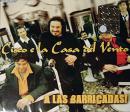
Dalla canzone di evidenza oggi di Ani di Franco ho trovato l' aggancio a questo link dedicato al treno per Praga. Io c'ero su quel treno organizzato da Ya basta e partito da Milano con la partecipazione di tanti centri sociali di tutta Italia. C'era anche Don Vitaliano da Avellino, il prete rosso sempre impegnato nelle fabbriche e con i giovani. Mi ricordo che ha celebrato una messa sui binari della frontiera con la Cecoslovacchia dove ci hanno tenuti fermi per un pacco di ore.
È stato il viaggio in cui ho assistito alla prima esibizione delle tute bianche dell' allora giovane Casarini. Una pantomima di esibizioni di militanti imbottiti di polistirolo sotto i manganelli della polizia a guardia del ponte che ci separava dal palazzo dove si riunivano i portavoce del FMI. Ci si passava il casco da uno all altro per poi vedere chi resisteva di più sotto le manganellate.
Ma le più brave erano... (continuer)
È stato il viaggio in cui ho assistito alla prima esibizione delle tute bianche dell' allora giovane Casarini. Una pantomima di esibizioni di militanti imbottiti di polistirolo sotto i manganelli della polizia a guardia del ponte che ci separava dal palazzo dove si riunivano i portavoce del FMI. Ci si passava il casco da uno all altro per poi vedere chi resisteva di più sotto le manganellate.
Ma le più brave erano... (continuer)
Paolo Rizzi 4/4/2025 - 21:01
באַריקאַדן - מאַמעס, טאַטעס, קינדערלעך

Nel 1955 lo scrittore Moishe Knapheis scrisse che questa canzone "rotolava come una moneta d'oro attraverso le città ebraiche della Polonia da tutte le povere case e dai locali operai, dalle cantine e dalle soffitte, da ogni parte si diffondeva il canto gioioso, trillato da giovani e sottili vocine". Svariati musicisti klezmer l'hanno interpretata, i Klezmatics sono i più famosi.
BARRICATE
(continuer)
(continuer)
24/9/2024 - 21:50
Balbo t'è pasè l'Atlantic (mo miga la Pärma)
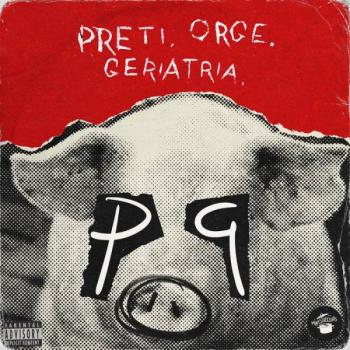
[2024]
Preti. Orge. Geriatria.
Mi intendo abbastanza poco di stili musicali moderni, come musica sono rimasto circa al XII Secolo (e già l'Ars Nova del XIV secolo è un po' troppo moderna per i miei gusti), ma questo brano dei parmigiani P.O.G. (Preti Orge Geriatria), che immagino debba essere ska punk rock ecc. ecc. o qualcosa del genere è comunque degno di ben figurare in CCG/AWS e, credo, non sarebbe per niente dispiaciuto a certi antichi e sanguigni concittadini degli autori, come fra' Salimbene de Adam o Gherardo Segalelli (o Segarelli). Ritorniamo, in rigoroso dialetto pramzàn, alle barricate dell'Oltretorrente di centodue anni fa con un vivido racconto dove si mescolano la voglia di comprarsi una moto, gli anolén, Guido Picelli, le barricate e il famoso detto a presa di culo del gerarcone fascista ferrarese Italo Balbo, autore di màschie, eròiche e italiche trasvolate aeree, ma che non riuscì, con le sue camicie nere, a passare la Parma. [RV]
Preti. Orge. Geriatria.
Mi intendo abbastanza poco di stili musicali moderni, come musica sono rimasto circa al XII Secolo (e già l'Ars Nova del XIV secolo è un po' troppo moderna per i miei gusti), ma questo brano dei parmigiani P.O.G. (Preti Orge Geriatria), che immagino debba essere ska punk rock ecc. ecc. o qualcosa del genere è comunque degno di ben figurare in CCG/AWS e, credo, non sarebbe per niente dispiaciuto a certi antichi e sanguigni concittadini degli autori, come fra' Salimbene de Adam o Gherardo Segalelli (o Segarelli). Ritorniamo, in rigoroso dialetto pramzàn, alle barricate dell'Oltretorrente di centodue anni fa con un vivido racconto dove si mescolano la voglia di comprarsi una moto, gli anolén, Guido Picelli, le barricate e il famoso detto a presa di culo del gerarcone fascista ferrarese Italo Balbo, autore di màschie, eròiche e italiche trasvolate aeree, ma che non riuscì, con le sue camicie nere, a passare la Parma. [RV]
Senta il bombi in-t-la via
(continuer)
(continuer)
envoyé par Dq82 4/5/2024 - 09:46
Parcours:
Barricades, CCG Antifà: Antifascisme militant
Daniela -k.d.- e Riccardo Venturi, 6-5-2024 18:37
Balbo hai passato l'Atlantico (ma mica la Parma!)
(continuer)
(continuer)
La barricata

1994
Renato Franchi e Kanzonaccio Band
Scritta da Renato Franchi e G. Colombo
E spesso durante gli scontri si erige una Barricata, che in questo caso separa chi sfrutta e chi opprime da chi invece lotta con coraggio per un ideale, un diritto, un sogno, un cambiamento.
marynowhere.com
Renato Franchi e Kanzonaccio Band
Scritta da Renato Franchi e G. Colombo
E spesso durante gli scontri si erige una Barricata, che in questo caso separa chi sfrutta e chi opprime da chi invece lotta con coraggio per un ideale, un diritto, un sogno, un cambiamento.
marynowhere.com
Da questa parte stretta della barricata
(continuer)
(continuer)
envoyé par Dq82 2/1/2023 - 17:55
Parcours:
Barricades
Oltretorrente (Canzone d'amore)
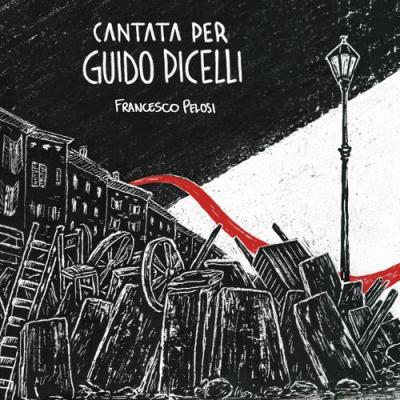
[2022]
Musica / Musique / Music / Sävel: Francesco Pelosi
Testo / Lyrics / Paroles / Sanat: Francesco Pelosi
Album / Albumi: Cantata per Guido Picelli
Francesco Pelosi: Cantata per Guido Picelli [2022]
℗ 2022 Francesco Pelosi
Released on: 2022-07-10
Producer: Rocco Marchi
Composer: Francesco Pelosi
Arranger: Nicolas Furlan
Arranger: Rocco Marchi
Arranger: Luigi Martinelli
Arranger: Francesco Pelosi
- Noi che desideriamo senza fine
- Oltretorrente (Canzone d'amore)
- Figli dell'officina (Giuseppe Raffaelli - Giuseppe del Freo, 1921)
- ¡A las barricadas! (Valeriano Orobón Fernández - Hildegart Taege, 1932)
- El Ejército del Ebro (Anonimo / Anonymous, 1936)
- Si la bala me da (Wenn das Eisen mich mäht, Josef Luitpold, 1915)
- Barricate in ogni paese
- In morte di Picelli
Cent'anni sono passati, ma nei giri del giovane Francesco Pelosi per la sua Parma non lo sembrano... (continuer)
Musica / Musique / Music / Sävel: Francesco Pelosi
Testo / Lyrics / Paroles / Sanat: Francesco Pelosi
Album / Albumi: Cantata per Guido Picelli
Francesco Pelosi: Cantata per Guido Picelli [2022]
℗ 2022 Francesco Pelosi
Released on: 2022-07-10
Producer: Rocco Marchi
Composer: Francesco Pelosi
Arranger: Nicolas Furlan
Arranger: Rocco Marchi
Arranger: Luigi Martinelli
Arranger: Francesco Pelosi
- Noi che desideriamo senza fine
- Oltretorrente (Canzone d'amore)
- Figli dell'officina (Giuseppe Raffaelli - Giuseppe del Freo, 1921)
- ¡A las barricadas! (Valeriano Orobón Fernández - Hildegart Taege, 1932)
- El Ejército del Ebro (Anonimo / Anonymous, 1936)
- Si la bala me da (Wenn das Eisen mich mäht, Josef Luitpold, 1915)
- Barricate in ogni paese
- In morte di Picelli
Cent'anni sono passati, ma nei giri del giovane Francesco Pelosi per la sua Parma non lo sembrano... (continuer)
Te, che non conosci la mia vita,
(continuer)
(continuer)
envoyé par Riccardo Venturi 15/12/2022 - 04:47
Parcours:
Barricades, Chansons d'amour contre la guerre

Riccardo Venturi, 15-12-2022 06:14
Oltretorrente: A Love Song
(continuer)
(continuer)
Barricate in ogni paese
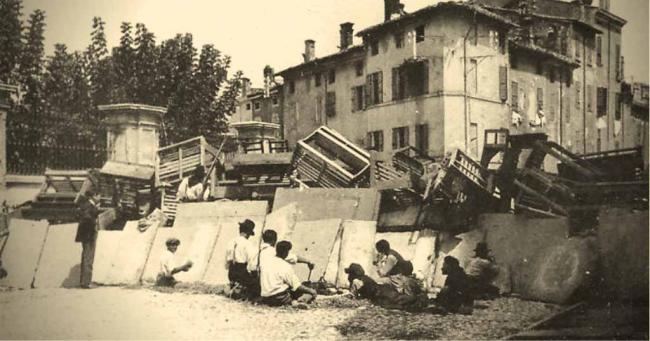
[2022]
Testo e musica / Lyrics and music / Paroles et musique / Sanat ja sävel: Francesco Pelosi
Album / Albumi: Cantata per Picelli
Torna Francesco Pelosi, che, a dire il vero, ultimamente fa il fumettista; ma fumetto, canzone e teatro si confondono, o si fondono, nella sua ragguardevole iniziativa di questo fosco 2022 che segna, come sapete, il centenario della presa del potere da parte del fascismo in Italia. Tutto parte da una Graphic Novel che Francesco Pelosi ha sceneggiato, con i disegni di Rise, in occasione di un altro centenario: quello della rivolta dell'Oltretorrente, a Parma, nei primi giorni d'agosto del medesimo 1922. Una rivolta antifascista ancora prima che il fascismo prendesse il potere, diecimila camicie nere guidate da Italo Balbo respinte dai proletari dell'Oltretorrente, del Naviglio e di Saffi e fatti sloggiare dalla città ducale: Balbo, t'è pasè l'Atlantic, mo... (continuer)
Testo e musica / Lyrics and music / Paroles et musique / Sanat ja sävel: Francesco Pelosi
Album / Albumi: Cantata per Picelli
Torna Francesco Pelosi, che, a dire il vero, ultimamente fa il fumettista; ma fumetto, canzone e teatro si confondono, o si fondono, nella sua ragguardevole iniziativa di questo fosco 2022 che segna, come sapete, il centenario della presa del potere da parte del fascismo in Italia. Tutto parte da una Graphic Novel che Francesco Pelosi ha sceneggiato, con i disegni di Rise, in occasione di un altro centenario: quello della rivolta dell'Oltretorrente, a Parma, nei primi giorni d'agosto del medesimo 1922. Una rivolta antifascista ancora prima che il fascismo prendesse il potere, diecimila camicie nere guidate da Italo Balbo respinte dai proletari dell'Oltretorrente, del Naviglio e di Saffi e fatti sloggiare dalla città ducale: Balbo, t'è pasè l'Atlantic, mo... (continuer)
Con i sassi del torrente, con le pietre del piazzale,
(continuer)
(continuer)
envoyé par Riccardo Venturi 30/11/2022 - 00:53
Parcours:
Barricades
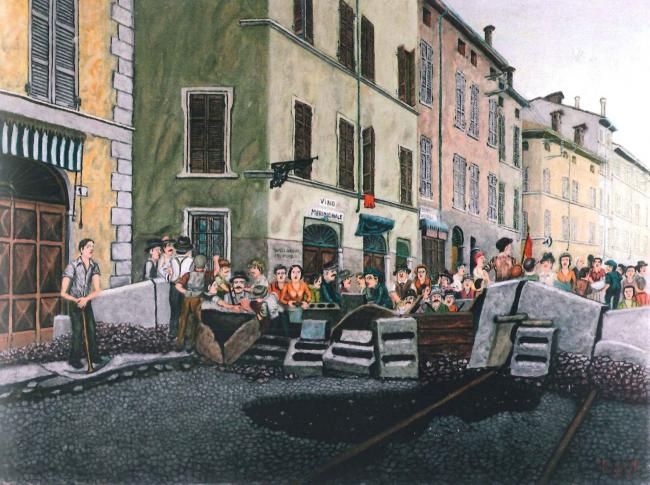
Riccardo Venturi, 30-11-2022 03:04
Barricades in All Countries
(continuer)
(continuer)
Chanson italienne — Barricate in ogni paese — Francesco Pelosi — 2022
Paroles et musique : Francesco Pelosi
Album : Cantata per Picelli
Francesco Pelosi est de retour, lui qui, à vrai dire, était dernièrement un dessinateur de bandes dessinées ; mais la bande dessinée, la chanson et le théâtre se confondent, ou se fondent, dans sa remarquable initiative en cette morne année 2022 qui marque, comme vous le savez, le centenaire de la prise du pouvoir par le fascisme en Italie. Tout part d’un roman graphique que Francesco Pelosi a écrit, avec des dessins de Rise, à l’occasion d’un autre centenaire : celui de la révolte d'Oltretorrente, à Parme, dans les premiers jours d’août de la même année 1922. Une révolte antifasciste avant même que le fascisme ne prenne le pouvoir, dix mille chemises noires menées par Italo Balbo repoussées par les prolétaires d’Oltretorrente, Naviglio et Saffi et chassées... (continuer)
Paroles et musique : Francesco Pelosi
Album : Cantata per Picelli
Francesco Pelosi est de retour, lui qui, à vrai dire, était dernièrement un dessinateur de bandes dessinées ; mais la bande dessinée, la chanson et le théâtre se confondent, ou se fondent, dans sa remarquable initiative en cette morne année 2022 qui marque, comme vous le savez, le centenaire de la prise du pouvoir par le fascisme en Italie. Tout part d’un roman graphique que Francesco Pelosi a écrit, avec des dessins de Rise, à l’occasion d’un autre centenaire : celui de la révolte d'Oltretorrente, à Parme, dans les premiers jours d’août de la même année 1922. Une révolte antifasciste avant même que le fascisme ne prenne le pouvoir, dix mille chemises noires menées par Italo Balbo repoussées par les prolétaires d’Oltretorrente, Naviglio et Saffi et chassées... (continuer)
BARRICADES DE TOUS PAYS
(continuer)
(continuer)
envoyé par Marco Valdo M.I. 30/11/2022 - 18:21
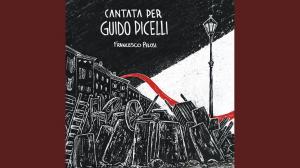
A las barricadas / El ejército del Ebro
Francesco Pelosi - Simone Baroni, Cantata per Guido Picelli [2022]
Francesco Pelosi - Simone Baroni, Cantata per Guido Picelli [2022]
Riccardo Venturi 8/12/2022 - 19:20
Inno della rivolta, o Inno del Molinari
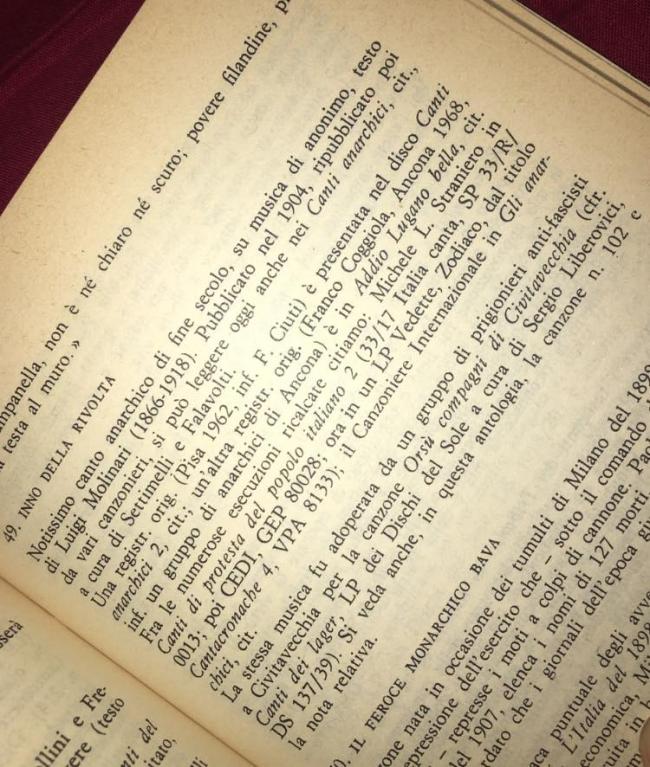
Scrive Rocco Rosignoli:
In realtà qualcuno deve averglielo fatto notare perché in questo video (a 16:54) riporta correttamente titolo e autore
Nel suo nuovo cd Guccini pubblica tante canzoni popolari e di matrice politica che hanno influenzato il suo modo di scrivere. In particolare una canzone, che lui chiama “Nel fosco fin dal secolo morente”, è la “mamma” de La Locomotiva. Guccini sostiene di non essere mai riuscito a scoprire da dove arrivasse questa canzone. L’enigma in realtà è di facile soluzione, basterebbe una ricerca online, su Canzoni Contro la Guerra o Il Deposito, ma forse anche solo su Wikipedia, la canzone è famosissima.
Ma anche sul cartaceo la storia della canzone è ben documentata: basta questo bel libro di Vettori di canzoni di protesta, un classicone degli anni ‘70, per scoprire che il testo ha un autore preciso, Luigi Molinari, e che il suo vero titolo è “Inno della rivolta”.
Non dico che fosse tenuto a saperlo… ma magari qualcuno non poteva cercargliele su Google queste info?
Ma anche sul cartaceo la storia della canzone è ben documentata: basta questo bel libro di Vettori di canzoni di protesta, un classicone degli anni ‘70, per scoprire che il testo ha un autore preciso, Luigi Molinari, e che il suo vero titolo è “Inno della rivolta”.
Non dico che fosse tenuto a saperlo… ma magari qualcuno non poteva cercargliele su Google queste info?
In realtà qualcuno deve averglielo fatto notare perché in questo video (a 16:54) riporta correttamente titolo e autore
27/11/2022 - 18:08
Aggiungo solo un parere personale: purtroppo l'età si fa notare e la voce di un ottantaduenne non può essere certo quella di una volta, ma l'arrangiamento balcanico dell'Inno della Rivolta nell'ultimo disco del Guccio è assolutamente godibile.
Lorenzo 27/11/2022 - 18:54
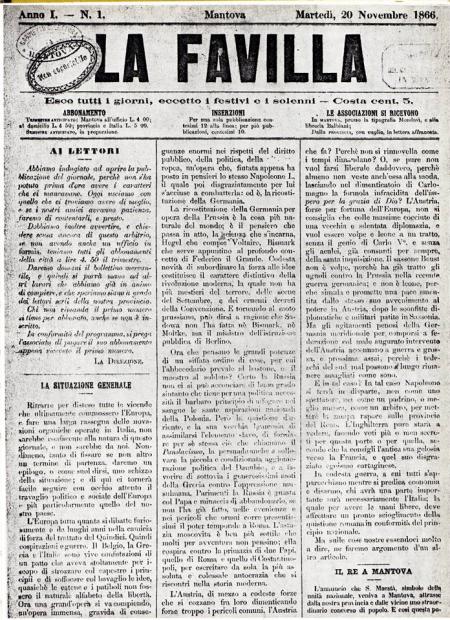
Dies Irae [1893] – La prima versione del canto
Del fosco dì del secolo morente
(continuer)
(continuer)
envoyé par Riccardo Venturi 28/11/2022 - 09:53
Veramente nel disco di Guccini c'è scritto Nel fosco fin DEL secolo e non DAL secolo, quello deve essere un refuso dell'articolo con la recensione.
Lorenzo 28/11/2022 - 23:09
×
![]()
- Confronter avec l'originale
- Confronter avec une autre version
- Chercher Vidéo sur YouTube
- Chansons reliées

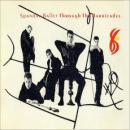
1s1. Vietnamese version from 1980
"The song was originally released in Vietnam in 1980 on the LP album "Ngọn Cờ Đỏ (Red banner)". The following lyrics was identified by listening to the song, so it is not yet correct whether they are the true lyrics or not, but I’ve contributed here for our information. Also the lyricist and choir have not yet been unknown..." [Boreč]